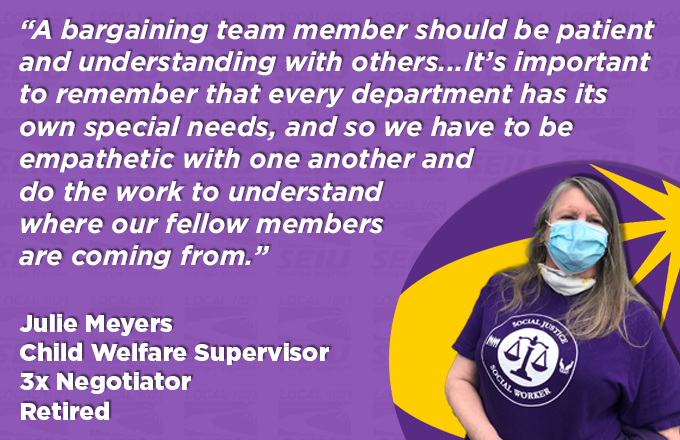
Julie Meyers, longtime SEIU 1021 member leader and 3x bargaining team member, reflects on her experience in negotiations
Want to submit a bargaining team nomination or learn about our upcoming negotiations? Visit SFfight.org for the most up-to-date news.
How long did you work for the city and county of SF and
what was your job title?
My name is Julie Meyers, and I was a Child Welfare
Worker and then a Supervisor with the City and County of San
Francisco for just over 31 years.
What first prompted you to want to run for the bargaining
team?
I was asked by Larry Bradshaw, who also recruited me to join
our local’s Executive Board. I would always ask Larry grievance
questions or for advice on workplace issues, and he suggested
that I run for the bargaining team to really learn the ins and
outs of our contract. I had been a steward for some time, but
there wasn’t a lot of involvement from our worksite on the
bargaining team so I decided to go for it. I’m so glad I did—it
really made it easier for me to learn about our rights and
protections at work and also become more familiar with what was
in our contract and how we could enforce it. Ultimately, I served
on the bargaining team for three negotiation cycles.
What is one of your favorite memories of serving on the
bargaining team?
In my years on the team, we had a couple of great contracts
that I’m very proud of it. The first contract I was part of
negotiating was probably my favorite. It was all very new and
exciting—I didn’t know the contract as well, and so it pushed me
to learn and know the ins and outs of the agreement. I didn’t
know anything about bargaining at first, so it was all a learning
process. As time went on, I soon felt more comfortable writing
proposals and taking on a larger role on the team. We got a great
contract that year, and it’s because we prioritized working
together for the common good. Having our members, both on the
bargaining teams and in the worksites, standing together is the
most important ingredient for success.
What is the contract victory you are most proud
of?
A lot of the city unions will often bargain back-to-back with
each other, and I always liked to go first so we could set the
tone for all the negotiations. A few cycles back, we didn’t go
first and had to fight tooth and nail to protect our medical
benefits and keep them 100% covered. Some negotiating teams with
our sister unions in San Francisco agreed to share part of those
healthcare costs with the employer, but we held strong and were
able to keep our medical coverage fully paid for, and we still
managed to win the same wage increases that everyone else did.
After that fight, the City didn’t even bother bringing up
healthcare costs with us at the table in the next round of
negotiations because they knew it would be a nonstarter for
us.
What did you find rewarding about being a bargaining team
member?
Learning the contract as a bargaining team member was
incredibly helpful in my grievance writing and work as a steward,
but in general I enjoyed the camaraderie of being on the team. I
loved meeting and working with members from other departments and
worksites and learning about their issues and goals. It’s
important for us to know what our fellow coworker around the city
are going through, and I loved how being on the bargaining team
brought us all together and expanded my
perspective.
What are good qualities for a bargaining team member to
have?
A bargaining team member should be patient and understanding
with others—this is especially important for new team members.
Things seem very odd at the beginning, but if you go in with an
open mind and ready to learn, you will absolutely catch on. It’s
important to remember that every department has its own special
needs, and so we have to be empathetic with one another and do
the work to understand where our fellow members are coming
from.
What would you say to someone who is considering
nominating themselves or a colleague for the bargaining
team?
It’s of course important to have people who have some
experience on the bargaining team, but it’s just as important—if
not more important—to have new people get involved. I would 100%
encourage anyone who is even remotely considering running or
nominating a colleague to do it. It’s such an amazing opportunity
to learn about our union, our contract, and everything happening
around our city.
I just retired this year and the thing that probably made it most
difficult for me to step away was knowing that I wouldn’t be
participating in bargaining at the table any longer. I always
enjoyed writing proposals and being at the table advocating for
myself and my coworkers. I’d recommend it wholeheartedly to
anyone.

